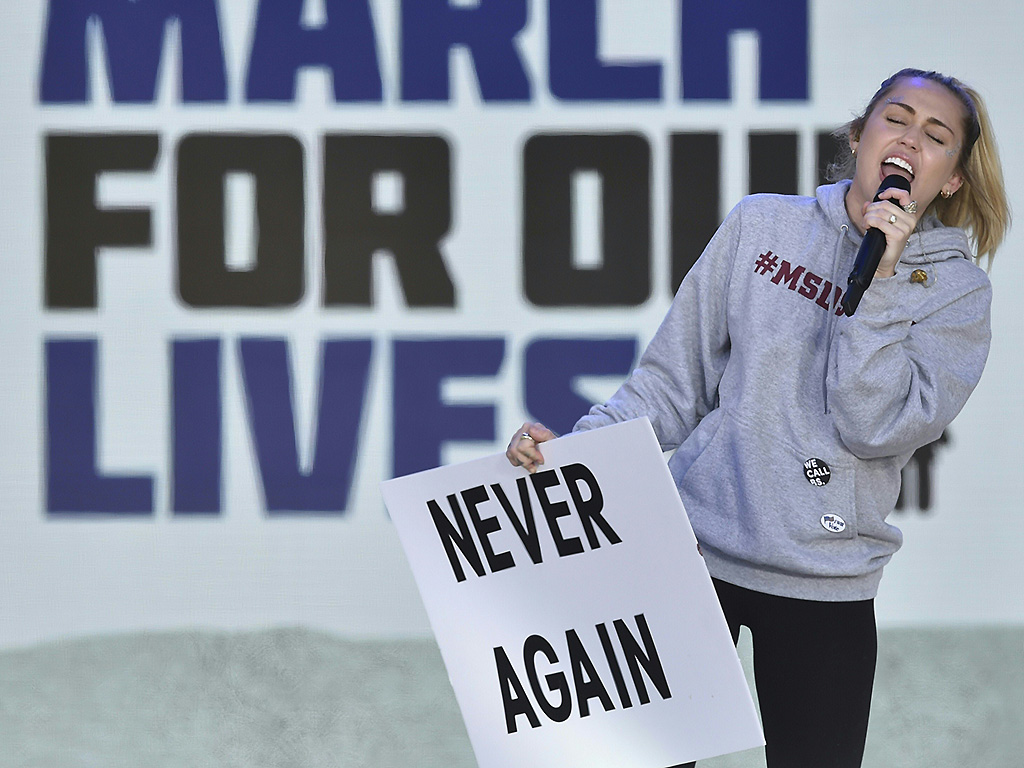Earlier this year, I received an email from Dave:

Alan,
What has happened today to the art of the protest song?
In the ’60s and ’70s, music was the voice of change, counter-culture and a generation. Alternative rock in the ’90s had some bands that carried the torch. But who carries it now?
In an era of Donald Trump, the 1% protests, #MeToo movements, etc., you would think that alternative music would be ripe to provide a soundtrack of bringing issues to light, but that is not the case. I can’t think of a mainstream protest song in recent years, except for Pearl Jam’s latest release and also Gord Downie’s activism with aboriginal rights. Red carpet celebrities do speak on their platform, but I don’t see new alternative bands taking a stance in their music.
Is this a result of news outlets already taking sides, or is society’s questioning of authority now common? Or has the business model for record labels changed so much that protest songs aren’t good for business?
I would love to hear your view on this.
Dave
These are all good questions that deserve answers.
There’s more than ever to protest about, especially in America.
Music is a cultural feedback loop and is always found downstream from what is happening in society. And thanks to the 24-hour news cycle —doesn’t it seem like it’s more like a six-hour cycle now? — bad news and conflict are coming at us faster and in greater quantities.
Let’s make a list of why anger is in the red.
- There’s continuing animosity toward the Trump administration, stoked by the pushback from Trump supporters. Issues like DACA, immigration, North Korea, Russia and Iran are not going away anytime soon. There are predictions that protest music prompted by Trump polices will boom in 2018.
- The battle over gun control continues. Will the kids involved in the March for Our Lives protests continue their efforts once school lets out? They seem to be taking a lot of cues from their elders from the 1960s. Meanwhile, the NRA and its supporters will inevitably have more to say.
- The #MeToo and #TimesUp movements have faded slightly from the headlines, but that anger is still very much alive.
- So far in 2018, 344 people have been shot and killed by police across the U.S. Every summer, some American city erupts after yet another police shooting of a black person. #BlackLivesMatter protests will continue.
- Is the Alt-Right on the rise? It sure seemed like it last summer. What will happen this year?
- Will the “take a knee” movement continue to sweep through the NFL this season? I’d bet on it continuing and spreading through other levels of the football world.
- Teachers’ strikes across states like West Virginia, Oklahoma, Colorado, and Arizona have been boisterous.
- The opioid crisis is not going away. In fact, it could be getting worse. This has many questioning the role of government, doctors and Big Pharma.
- The threat of terrorism and random acts of violence hangs over everyone.

Get breaking National news
An interesting observation: Have you noticed the number of grey-haired people participating in some of these demonstrations? Many are veterans of the protests of the 1960s who have decided that they need to hit the streets again.
There’s already some good protest music out there. You just have to look for it.
My favourite new angry band is The FEVER 333, a straight-edge group from Los Angeles that holds “demonstrations” instead of gigs and produces “broadcasts” instead of music videos. With support from friends like Travis Barker of blink-182, they could be a sign of things to come.
If you want more anger, turn to hip-hop.
Hip-hop has emerged as society’s driving force when it comes to music. Just as their forebears were involved in the civil rights movement in the 1960s, hip-hop artists and rappers haven’t been afraid to let their opinions be heard. Guys like J. Cole — one of the most polarizing performers we have today — are carrying on the tradition. When the Ferguson protests were in full force over the police shooting of Michael Brown, he released this song.
J. Cole’s new album, KOD (which stands for Kids on Drugs, King Overdosed and Kill Our Demons) takes on the epidemic of drug use, both illegal and prescription. And let’s not forget that Eminem seems fixin’ to explode.
At the same time, though, maybe the issue isn’t a lack of protest music.
Back in the 1960s, the entire counter-culture was driven by music. The hippy kids ate up this music because it was the galvanizing force of the generation. Today? Not so much. Protest music might be out there, but it just doesn’t have the same effect on the general population as it once did.
Could modern slacktivism be a reason why people aren’t paying more attention to protest music? Social media has distorted what activism and protest mean. For many people, changing the avatar on their Twitter account or leaving an angry comment on Facebook counts as protesting against The Man.
There’s also a sizeable number of people who think, “Nobody is listening to what I have to say. And even if they did, nothing will happen.” But if they get mad enough, who knows what they might do?
Let’s see what happens as the weather warms up. And remember that the barriers to getting new music out there are extremely low. All it could take is some kid with a bedroom recording posted on YouTube to light the next fire.
Alan Cross is a broadcaster with 102.1 the Edge and a commentator for Global News.
Subscribe to Alan’s Ongoing History of New Music Podcast now on Apple Podcast or Google Play






Comments